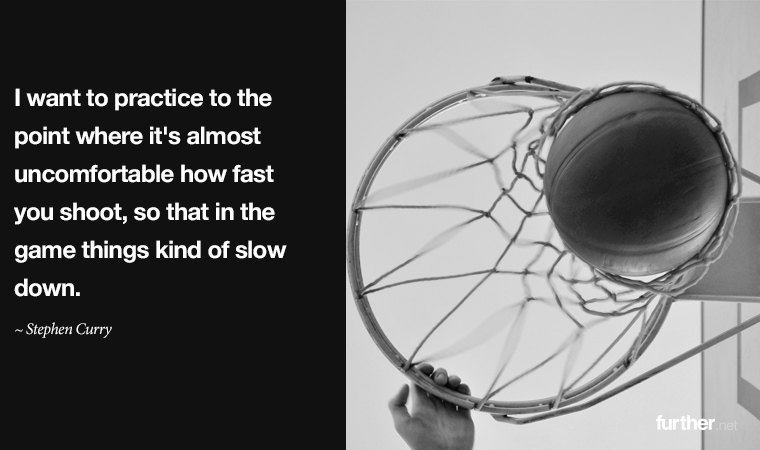
Beyond physical characteristics, skill, and general mindset, the leading edge of peak performance for elite athletes is perception. This amounts to the ability to essentially slow down the game and see minuscule indications that allow you to make the correct decision instantaneously.
Exhibit A: Stephen Curry of the Golden State Warriors.
At 6′ 3″ and 190 pounds, many are amazed that Curry even physically qualifies to play in today’s NBA. He’s not a formidible presence like LeBron James, and he can’t jump like Michael Jordan once did.
And yet, he became the first ever unanimous league MVP this year, after also winning the award last year and leading his team to win the NBA Championship. The Warriors are trying to repeat against the Cleveland Cavaliers again in this year’s Finals.
The secret is not just Curry’s almost supernatural three-point shooting abilities. It’s his ability (as a relatively small guy) to see opportunities for shots on a court filled with giants.
Science of Us did a great profile on Curry that reveals that this is no accident or inherent trait:
- If a player is within the norm of capacities like strength and speed, then perception, and the decision-making it engenders, is a “crucial factor” in how the best athletes demarcate themselves from high level but nonetheless typical pros.
Curry specifically trains his perceptive powers, otherwise known as “neurocognitive efficiency.” He works with a gentleman named Brandon Payne to increase his ability to process sensory input, even in at the top of of a sport dominated by elites. That means he’s “seeing more of the game, allowing him to exploit opponents’ positioning to create shots, find passing lanes, and force turnovers.”
How do you train this?
The article states that Payne’s training regimen for Curry — and now his teammates Draymond Green and Harrison Barnes — focuses on “overloading” the athlete with multiple tasks. Essentially you practice being bombarded with extraneous sensory stimulation while you continue to practice the general skill you’re working on (dribbling, shooting, etc.).
The research is just now starting to catch with the training techniques used with elite for the last several years, but the reported measurable improvements have been remarkable. Applications for we mere mortals may be available in the future.
Reading the piece, I couldn’t help noticing the similarities in Curry’s ability to “slow down the game” and perceive tactical nunaces to the flow states achieved by the extreme athletes features in Steven Kotler’s book The Rise of Superman (discussed here). Not only do these athletes live to “get in the zone,” they require it to survive life-or-death situations.
Generally, basketball is not a sport that kills you. Perhaps the intentional sensory training that athletes like Curry endure helps to induce and tighten flow in a way that facing certain death surfing the freakishly powerful Millennium Wave might naturally promote.
Interesting stuff. Dive into the entire article here:
Steph Curry Literally Sees the World Differently Than You Do
Keep going-
Brian Clark
Further
further: health
Ice Cream Man
While you’d think most of us lose weight during the warm weather, many people actually pack on pounds from taking a “vacation” from healthy eating from Memorial Day to Labor Day. Here’s how to avoid summer weight gain.
Steps to Avoid Summer Weight Gain
Carb Complexities
Cutting back on carbohydrates can have major benefits for your health. Many studies have shown that low-carb diets can help you lose weight and control diabetes or prediabetes. Here are 15 easy ways to reduce your carb intake.
15 Easy Ways to Reduce Your Carbohydrate Intake
Cardio Genius
Which makes you smarter: running or lifting weights? Meathead jokes aside, there’s new evidence that moderate aerobic exercise helps increase new brain cells, while strength training may not be much healthier for the brain than sitting on the couch.
Exercise Makes You Grow New Brain Cells—But Only The Right Kind Of Exercise
further: wealth
Take This Job And …
Managers routinely overload their subordinates, contact them outside of business hours, and make last-minute requests for additional work. To satisfy those demands, employees arrive early, stay late, pull all-nighters, work weekends, and remain tied to their electronic devices 24/7.
Managing the High-Intensity Workplace
Credit Worthy
While you actually have a few different credit scores, the most widely used model is the FICO score. Here are the five factors that determine this score.
5 Bad Money Habits and How They Affect Your Credit Score
Put This On the List
Are to-do lists about feeling a sense of accomplishment or actually getting things done? The typical way of writing lists can result in feeling good about yourself at the expense of productivity.
The Science of To-Do Lists: Psychology Can Make You More Productive
further: wisdom
The Focus Group
Concentration is contagious, according to a new study. Being around other people who are working hard automatically helps us work harder as well, researchers have found.
How To Concentrate Automatically Without Even Trying
Seven Year Ditch
Love is wonderful, love is joy, love is the greatest thing in the world. Love is also an enormous pain in the ass. Marriage is hard work.
How To Make A Relationship Last: 5 Secrets Backed By Research
Play to Your Strengths
When considering what they’d like to improve about themselves, people jump straight to weaknesses. Why give so much attention to improving our weaknesses? Why not build on our strengths?
A Self-Improvement Secret: Work on Strengths
further: sharing
Please forward this issue of Further to a friend who could benefit from it. Or use these easy social options:
